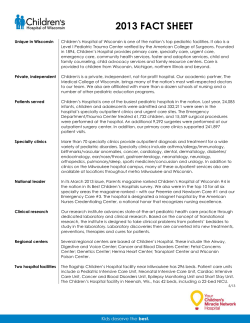
FACT SHEET The ABCs of Pediatric Physical Therapy What is Pediatric Physical Therapy?
FACT SHEET The ABCs of Pediatric Physical Therapy What is Pediatric Physical Therapy? Pediatric physical therapists (PTs) work with children and their families to assist each child in reaching their maximum potential to function independently and to promote active participation in home, school, and community environments. Physical therapists use their expertise in movement and apply clinical reasoning through the process of examination, evaluation, diagnosis, and intervention. As primary health care providers, PTs also promote health and wellness as they implement a wide variety of supports for children from infancy through adolescence in collaboration with their families and other medical, educational, developmental, and rehabilitation specialists. Pediatric physical therapy promotes independence, increases participation, facilitates motor development and function, improves strength and endurance, enhances learning opportunities, and eases challenges with daily caregiving. What Role Does the Family Play? Parents and families have the primary role in their child’s development. The pediatric PT collaborates with the family to promote development and implement an individualized intervention program for the child. Families are supported through coordination of services, advocacy, and assistance to enhance the development of their child. This can include: • Positioning during daily routines and activities Section on Pediatrics, APTA 1111 North Fairfax Street Alexandria, VA 22314-1488 Phone 800/999-2782, ext 3254 Fax 703/706-8575 E-mail: pediatrics@apta.org www.pediatricapta.org • • • • • Adapting toys for play Expanding mobility options Using equipment effectively Facilitating safety for the home and community Providing information on the child’s physical and health care needs • Smoothing transitions from early childhood to school and into adult life How Can Your Child Receive Pediatric Physical Therapy? Do Pediatric Physical Therapists Use Evidence-Based Practice? The process of supporting children and families begins with an interview, or conversation, to identify the child’s needs and family’s concerns and continues with an examination and evaluation of the child in the context of their daily routines and activities. This evaluation may include, but not be limited to, mobility, sensory and neuromotor development, use of assistive technology, muscle and joint function, strength and endurance, cardiopulmonary status, posture and balance, and oral motor skills. The Section on Pediatrics supports the use of evidence-based practice, which is the integration of research findings and clinical expertise by pediatric PTs in order to collaborate with families, health care providers, and educators to provide best practice to every child. Pediatric physical therapists may use evidencebased practice to provide any of the following services as part of their plan of care: The process of providing pediatric physical therapy continues with collaboration, consultation, and interventions in natural learning environments, including home, child care centers, preschools, schools, job sites, recreational centers, and other community settings. Children and families also may have contact with pediatric PTs in hospitals and clinics when receiving physical therapy for medical conditions, specialty health care services, or during episodes of acute care. Physical therapist assistants may be involved with the delivery of physical therapy services under the direction and supervision of a licensed PT. Is Your Child Entitled to Physical Therapy Services? Private and public health insurance programs cover payment for physical therapy, but the services and reimbursement may vary and families should be familiar with the benefits provided by the policy or program. In addition, provision of pediatric physical therapy is required legislatively by: • The Individuals With Disabilities Education Act (IDEA), which includes provisions for pediatric physical therapy for children from birth to 21 years of age who are eligible for early intervention (Part C) or special education and related services (Part B) • Section 504 of the Rehabilitation Act, which requires the provision of reasonable accommodations, including physical therapy, for persons with disabilities • The Americans With Disabilities Act, which protects the rights of all individuals with disabilities 2 • • • • • • • • • • • • • • • Developmental activities Movement and mobility Strengthening Motor learning Balance and coordination Recreation, play, and leisure Adaptation of daily care activities and routines Equipment design, fabrication, and fitting Tone management Use of assistive technology Posture, positioning, and lifting Orthotics and prosthetics Burn and wound care Cardiopulmonary endurance Safety, health promotion, and prevention programs How Are Pediatric Physical Therapists Licensed? Pediatric PTs have a special interest and desire to work with children and families and lend their unique talents and professional knowledge to children with many different conditions and strengths. Physical therapists and physical therapists assistants must be graduates of accredited educational programs and comply with rules of licensure, registration, and practice as applicable in any state in which they are practicing. Additional credentials related to specialization in content, skills, or other academic degrees may be used to further identify an individual and their practice. The ABCs of Pediatric Physical Therapy For More Information: If you have additional questions, would like to order additional copies of this fact sheet, or would like to join the Section on Pediatrics, please contact the Executive Office of the Section on Pediatrics of the American Physical Therapy Association at: APTA Section on Pediatrics, 1111 North Fairfax Street, Alexandria, VA 22314, pediatrics@apta.org, www.pediatricapta.org. © Copyright 2009. Developed by the Practice Committee of the Section on Pediatrics, APTA, with special thanks to expert contributors Mary Jane Rapport, PT, PhD, Lisa Chiarello, PT, PhD, PCS, and Lynn Jeffries, PT, PhD, PCS. Section on Pediatrics, APTA 1111 North Fairfax Street Alexandria, Va 22314-1488 Phone 800/999-2782, ext. 3254 Fax 703/706-8575 E-mail:pediatrics@apta.org www.pediatricapta.org Section on Pediatrics, American Physical Therapy Association 3
© Copyright 2025





















